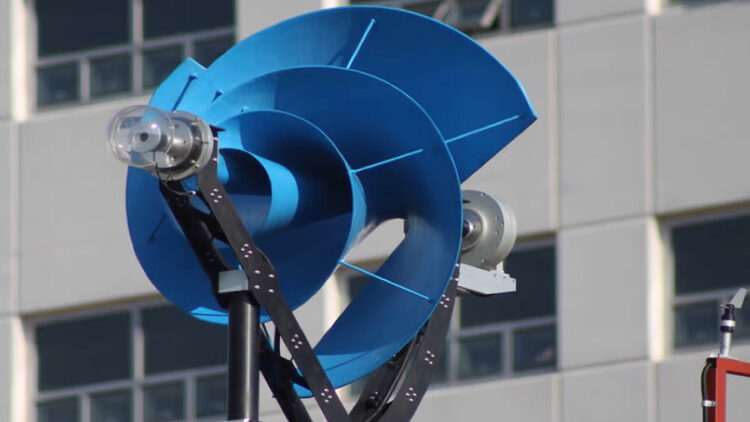With the rising demand for sustainable energy sources, conventional silicon photovoltaic (PV) solar panels have long dominated the residential solar market. However, a groundbreaking alternative has emerged: the LIAM F1 UWT, a quiet and compact wind turbine designed by Archimedes, a Dutch research and development company. This cutting-edge technology aims to disrupt the established solar monopoly in renewable energy generation.
Introducing the LIAM F1 UWT: Silent, sustainable, and incredibly efficient
In contrast to conventional wind turbines, which are often bulky and noisy, the LIAM F1 UWT sets itself apart with its streamlined design and near-silent operation.
Measuring only 59 inches in diameter and weighing under 220 pounds, this turbine features a unique spiral rotor design that allows it to efficiently capture wind energy from all directions. It guarantees optimal performance, even in varying wind conditions. Operating at noise levels no higher than 45 decibels, the turbine runs quietly, making it suitable for urban settings where noise pollution is a concern.
As these aforementioned settings become more densely populated, maximizing limited residential space is crucial. Integrating the LIAM F1 UWT into rooftops and gardens has the potential to transform our approach to renewable energy.
This compact yet efficient turbine has the capability to produce between 300 and 2,500 kilowatt-hours of electricity annually with a wind speed of 11 miles per hour, offering homeowners an additional energy source to supplement their solar systems. This hybrid strategy can greatly enhance energy independence, especially in areas that receive less sunlight.
Combining LIAM F1 UWT and PV solar panels: A new wind energy approach
Although PV solar panels have long been a popular choice for eco-conscious homeowners, their dependence on sunlight limits their efficacy. This limitation is especially significant during winter months or in regions with cloudy climates. In contrast, the LIAM F1 UWT harnesses wind energy, a source that is consistently available and provides reliable power around the clock.
This means that homeowners can maintain a steady energy supply even during periods when solar energy generation dips, thereby enhancing overall energy security.
As cities ramp up their initiatives to tackle climate change, innovative solutions such as Archimedes’ silent wind turbine offer a stunning vision for a carbon-free future. It’s heartening to imagine urban landscapes where these turbines and PV solar panels are used simultaneously to create a decentralized energy network, enhancing sustainability while also preserving the aesthetic appeal of city life.
By integrating small-scale technologies such as this turbine into urban planning, cities can dramatically decrease their carbon footprints and fulfill substantial energy demands.
Redefining renewable energy: The future of wind energy and solar integration
The LIAM F1 UWT is merely the beginning of the transformation within the renewable energy sector. In fact, Archimedes intends to expand its innovation to marine wind turbines, as well as wind-solar hybrid systems, further boosting energy efficiency.
The type of diversification offers homeowners dependable, environmentally friendly energy sources throughout the year, strengthening their energy independence.
Once more, it’s worth emphasizing that although the popularity of PV solar panels continues to rise, experts warn that depending solely on one energy device can present challenges, especially during less productive seasons such as winter. By adopting the LIAM F1 UWT, homeowners can mitigate these risks while enjoying the benefits of a diversified renewable energy system.
With the introduction of the LIAM F1 UWT, we now have a promising alternative to conventional energy solutions. Not only does it complement existing solar systems, but it also bolsters energy security and independence. Integrating advanced technologies like this turbine brings us closer to a greener future and is essential for addressing our pressing energy challenges.

